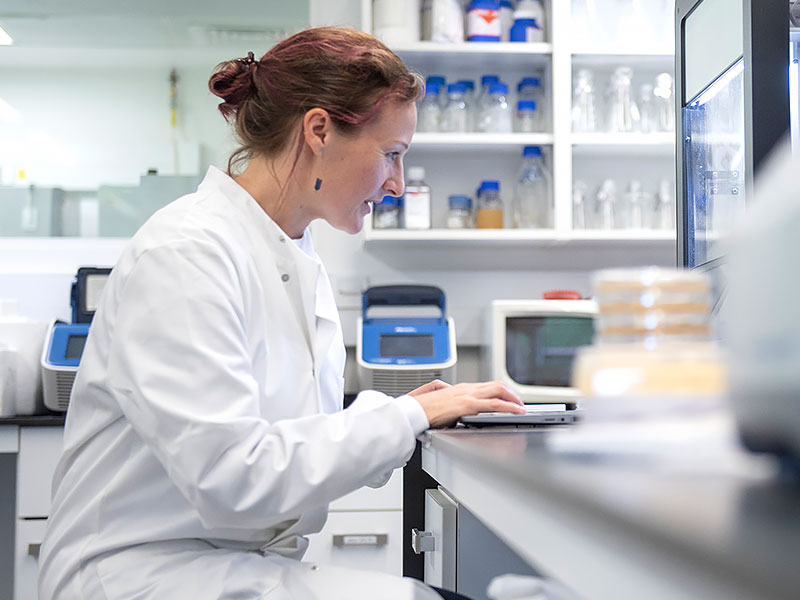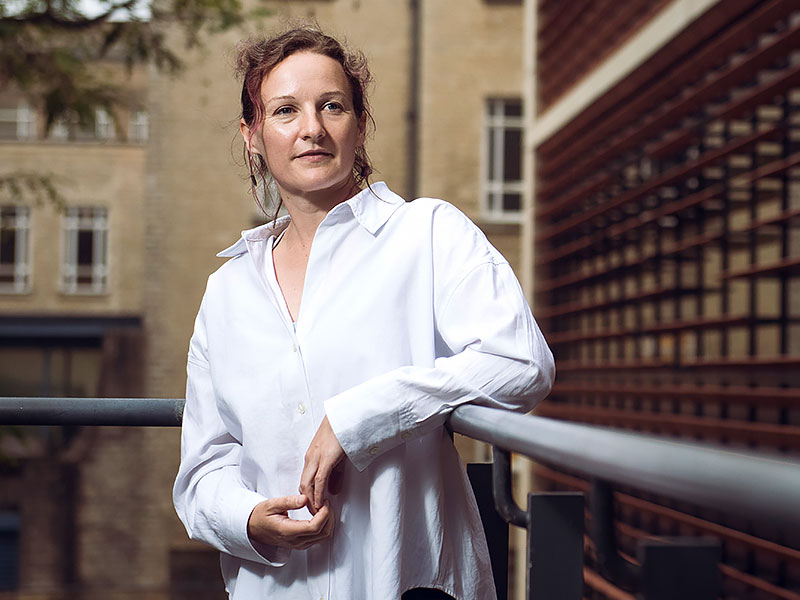Unlocking the secrets of the gut microbiome
Undaunted by its complexity, Professor Emma Slack is pioneering new methods of engineering the body’s largest microbiome to improve health and protect against disease.
Before 2006, research into the microorganisms that colonise our internal and external body surfaces was ‘sort of niche,’ says Professor Emma Slack, the inaugural holder of the Barclay Williams Chair of Molecular Immunology at the Sir William Dunn School of Pathology and a leader in the rapidly growing field of the human gut microbiome. ‘It was kind of difficult work, and it was a bit disgusting and so not many people really did anything with it,’ she explains.
That all changed with the advent of next-generation sequencing techniques, which made it possible for researchers to extract DNA from these microbial consortia and work out which organisms were actually present. ‘It led to an explosion in the field,’ says Professor Slack, ‘and the realisation that the majority of microbes we encounter in our daily lives are not pathogens; they’re microbes that live on us and in us and, maybe unsurprisingly, have a massive impact on how our bodies work, from how we respond to vaccines through to our risk of getting allergies and the ageing process.’
Each of us lives in symbiosis with trillions of these microbes: bacteria, fungi, archaea and viruses that make our skin, eyes, lungs and reproductive systems their homes. But it is the gut where the largest of the body’s microbiomes, and most significant for our short- and long-term health, can be found. Gut microbes control the digestion of food, the central nervous system and the immune system, while differences in their composition and function have been associated with a vast range of conditions, from obesity and degenerative brain diseases to depression and chronic inflammation.
 Professor Emma Slack in the lab. Photo by John Cairns
Professor Emma Slack in the lab. Photo by John Cairns
But despite the clear link between the gut microbiome and our overall health, there is still much we don’t understand about it, says Professor Slack. The gut microbiome is mind-bogglingly complex: the microbial consortia living in the intestine of an average person is made up of between 500 and 1,000 different species, with each of those species possessing a genome of around 1-2,000 genes. ‘That’s already up to one million genes,’ she notes. The human genome, in comparison, has around 20,000. ‘Our understanding of what the functions are in these microorganisms is way lower than anything we know about mammalian metabolism. There’s a lot of darkness in there.’
It is the desire to cast a light into this darkness that drives Professor Slack’s research today. Through her work in Oxford she is striving to understand how the composition of the microbiome in our intestine influences the types of immune responses we make against oral vaccines. ‘This is something that we know there are massive differences in internationally,’ she says. ‘If you compare immune responses to oral vaccines in westerners to people living in the tropics, particularly those in low economic environments, then you typically see much weaker immune responses in the latter group.’
While there are many things that can play into this disparity, from nutritional status to genetics, studies in the lab show that increasing the pathogen burden in the gut microbiome dramatically decreases the efficacy of oral vaccines. This presents a major barrier to their mainstream use, explains Professor Slack. ‘Oral vaccines are very convenient, you just swallow a tablet or a liquid, you don’t have to go to a doctor, there are no needles involved… but as long as we have this massive variation in response from individual to individual it will be very difficult to roll them out as standard vaccine programmes.’
‘One of the challenges is that we're dealing with this vast diversity of organisms and genetics and functions, and trying to make sense out of something that's pretty close to chaos when you look at it at a whole population level’
To overcome this challenge Professor Slack and her team are working to uncover the mechanisms that make our microbiomes suppress induction of these immune responses via the gut, and then find interventions that will ensure everybody responds well. In parallel, they are also pioneering the development of oral vaccines that target E. coli, salmonella and Shigella – bacterial groups where we have some of the biggest problems with the outgrowth of antibiotic-resistant infections.
Making vaccines against bacteria is notoriously challenging, but the reward for success could be enormous. In 2021, before taking up her post in Oxford, Professor Slack began developing a new oral vaccine against food poisoning by salmonella, which relies on manipulating how the pathogen evolves in the gut. ‘This is the concept of making an evolutionary trap using your immune system that should not only get rid of the bacteria in your own system, but mean that what is actually being shed after an infection is not able to infect anyone else,’ she explains.
This is work that Professor Slack plans to continue in Oxford, where she has had a lab since spring 2023. She was initially drawn here by the University’s critical mass of knowledge about vaccine development, and by the collaborative environment that exists at the Dunn School. ‘There are so many great people working on various projects,’ she says, ‘from the biophysics of immune responses through to very, very good microbiologists who understand how the surface of bacteria are being regulated. There are a lot of possibilities here for us as collaborators.’
 Professor Emma Slack on the Dunn School terrace. Photo by John Cairns
Professor Emma Slack on the Dunn School terrace. Photo by John Cairns
These are possibilities that can only be realised thanks to the generosity of the CIU Trust and the Edward Penley Abraham Research Fund, which together endowed the post that Professor Slack now holds. The Barclay Williams Chair of Molecular Immunology was established last year and named after the distinguished Dunn School immunologists Neil Barclay and Alan Williams. ‘It is a bit of an honour to be following in their footsteps,’ says Professor Slack, ‘carrying on their work in immunology and trying to take it further and make it even more useful.’
It was perhaps inevitable that Professor Slack would end up here one day, driving this particular field forward. Her interest in the immune system began at an early age, when she would accompany her father – a family doctor – on his rounds in the small village where they lived. ‘It always seemed strange to me that you could have this system inside you that could recognise all these things but still people got sick and died,’ she says. ‘I always thought that surely, we must be able to use it and manipulate it to actually improve health.’ It is a thought that continues to guide her work today.
Support research at the Dunn School